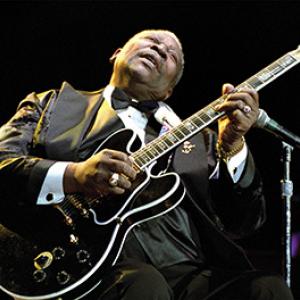
Danny Duncan Collum, author of the novel White Boy, teaches writing at Kentucky State University in Frankfort.
Posts By This Author
The Crooked Path of Iris DeMent

Iris DeMent / irisdement.com
NOTHING ABOUT Iris DeMent is predictable. She has what may be the most downhome country singing voice in American popular music today, but she really grew up in Los Angeles. Her family fled her Arkansas birthplace after her father led an unsuccessful wildcat strike at his factory job and was rendered unemployable at home.
DeMent was the youngest in a family of 14 children and grew up in the Assemblies of God church. Her personal favorite among her six albums is Lifeline, which features her sitting at the piano singing gospel hymns such as “Blessed Assurance” and “Sweet Hour of Prayer.” Yet her 2012 album, Sing the Delta, featured a song titled “The Night I Learned How Not to Pray,” and an earlier song, “Let the Mystery Be” (now the theme song for the HBO series The Leftovers), professes agnosticism about the whole business of where we come from and where we are going.
Still, in a recent interview in Discussions magazine, DeMent confessed that she understands her musical work as a “calling” and said, “I’ve always thought more in my spiritual world—and my connection to whatever brought me here and whatever is going to take me out—than any notion of a career.”
The crooked path of her career certainly bears that out. In the great 1990s flowering of alternative country, DeMent popped out three albums that had critics comparing her to her idol and fellow California refugee Merle Haggard. But then came a 16-year silence, broken in the middle only by the aforementioned gospel record.
That silence ended with Sing the Delta, which was a bit of a surprise itself. After decades of living in the Midwest, marrying fellow singer-songwriter Greg Brown and adopting a child with him, DeMent looped back and produced a set of songs steeped in obsession with her Arkansas roots. Now, after only three years, comes another album and another surprise. The Trackless Woods finds DeMent singing poems by the Russian writer Anna Akhmatova, who lived through the Stalinist persecutions.
Why My Family Has an Anti-NFL Policy

David Lee / Shutterstock
BASEBALL USED to be our national pastime. But now professional football is America’s game. And why not? It’s a violent, capital-intensive spectacle carried on with reckless disregard for human health and safety. Kind of like our foreign policy, or our criminal justice system.
Last fall, 45 of the 50 most-watched TV shows were National Football League games. It is the most profitable of the major sports. The average NFL franchise brings in $286 million per year, compared to $237 million for Major League Baseball—despite baseball’s 162-game regular season vs. football’s 16.
This year the TV audiences for football are expected to grow, and NFL total revenue is expected to top $12 billion. Nothing seems to put a dent in the U.S. enthusiasm for the game. Some coaches have offered cash rewards for the injury of opposing players. Multiple players face charges for violent crimes. The Patriots cheat in the playoffs. And the game just gets more popular.
Maybe that will change this Christmas when the movie Concussion, featuring Will Smith and Alec Baldwin, is scheduled to be released by Sony Pictures. Concussion tells the story of Dr. Bennet Omalu, the Pittsburgh forensic pathologist who discovered the decisive link between repeated minor head trauma—such as from huge men crashing into each other dozens of times a day—and the bewildering array of mental illnesses that afflicts many NFL retirees.
Elegant Beats

Ekaphon maneechot / Shutterstock
AS KIDS, Wilner Baptiste (viola) and Kevin Sylvester (violin) might have been labeled classical music nerds. They played in the orchestra at their Fort Lauderdale, Fla. performing arts high school and went to college on full music scholarships. They have excelled in an insular and rarified world: one in which people devote hours every day to mastering the subtleties of antique and unforgiving instruments and the difficult repertoire left by the dead white guys. It’s a sphere peopled almost entirely by whites and Asians, and Baptiste and Sylvester are neither.
“Wil B” Baptiste and “Kev Marcus” Sylvester are Black Violin, a duo that fuses the thrilling virtuosity of the European classical world with the booty-shaking funk and street-level grace of hip-hop. In September they released their first major-label album, Stereotypes.
While these two young men were honing their chops in that high school orchestra, they were also typical turn-of-the-century hip-hop kids, tuned into the world of rap. After graduating from different colleges, the two got back together and worked the South Florida clubs, developing an act that involved playing classical-string covers of hip-hop hits.
I know, this whole hip-hop and classical thing sounds like a gimmick, and if I’d read about it before I heard these guys, I probably wouldn’t have been interested. It sounds too much like the prog-rock abominations of the 1970s, when rock operas and rock symphonies almost killed off rock and roll. But I was lucky enough to hear Black Violin live before I ever read about them. They were playing at a banquet honoring top academic achievers from historically black colleges and universities. It was the perfect pairing of artist and audience. Taking the stage backed by a live drummer and a deejay, Black Violin rocked the house with sophisticated sparkle.
Singing the People's Blues
THE DEATH of B.B. King this spring was marked by an outpouring of homage appropriate to the man’s talent, his influence on U.S. culture, and his fabled personal humility and generosity.
He started out picking cotton and singing on the street and ended as one of the most famous and honored men on earth—a classic rags-to-riches tale. But King wasn’t just a black Horatio Alger. And his story wasn’t just one of individual striving and achievement. King also understood that his art was rooted in the collective struggle of his people and that he was a part of that struggle.
I grew up about 30 miles from B.B. King’s Sunflower County, Miss., home, but I discovered him the same way most white people my age did, by hearing “The Thrill Is Gone” on the radio. It’s a recording that still jumps out of the speakers and grabs the heart. It starts with a mournful guitar melody. Then, behind verse two, an eerie, quavering wash of strings begins low in the mix and rises through the rest of the song. By the time King wails out to his lover, “I’m free from your spell, and now that it’s all over, all I can do is wish you well,” you knew you were hearing the last words of a dying man.
Revisiting the Sugar Bowl

aarrows / Shutterstock
AS THIS IS written, the U.S. and Cuba are in the final stages of the haggling that will likely lead to the opening of embassies in Havana and Washington, and peace, love, and understanding seem to be breaking out all over. Pope Francis, who helped broker the U.S.-Cuba thaw, will visit the island in September on his way to the U.S. After a recent meeting with the pope, Cuban President Raul Castro said, “if the pope continues to talk as he does, sooner or later I will start praying again and return to the Catholic Church.” And Major League Baseball is already working on bringing at least spring training games back to baseball-crazy Cuba.
In the U.S. media, discussion of the new détente with Cuba has focused almost entirely on the past 55 years of Cold War-inspired confrontation. However, the U.S. and Cuba had a close and troubled relationship for a full 60 years before Fidel Castro took power, and as hostilities wane and the U.S. economic embargo against Cuba is eventually dropped, the patterns of this U.S.-Cuban “prehistory” may become important again.
That story begins in 1898, when the U.S. empire first extended beyond our North American shores as the U.S. took control of Cuba, Puerto Rico, and the Philippines at the end of the Spanish-American War. Puerto Rico we still hold.
Rock-and-Roll Transcendence
THE CLUB WAS full by the time New Jersey’s The Gaslight Anthem took the stage. Lead singer and songwriter Brian Fallon stepped to the mike in denim jacket and jeans, and the band lit into their song “Howl” (yes, a Ginsberg reference). That’s when I heard a strange doubling sound on Fallon’s vocal. The Gaslight Anthem is very much straight-ahead, meat-and-potatoes, guitars-and-drums. Why would they use that weird effect on the vocal?
Then it hit me. That sound wasn’t coming from the sound board or the speakers, but from us. The audience, en masse, was singing along with every word, on time and in tune. It was what happens when rock and roll is working right: The performers and the audience become one and are swept up into something much larger than themselves.
Epic Bad Behavior
EARLIER THIS year came a flurry of new horror stories about the abuses of human dignity that are, apparently, common in many of America’s college fraternities. First came the video from the University of Oklahoma in which a busload of “true gentlemen” of Sigma Alpha Epsilon are seen and heard spewing racist bile. Shortly thereafter the revelation that the Kappa Delta Rho chapter at Penn State had maintained a private Facebook page featuring nude photos of unconscious young women became national news.
The old saying “Once a frat boy, never a man” may be just another sweeping stereotype. But the evidence is mounting that many of the nation’s fraternity houses are the breeding ground for an exclusive culture of entitlement and impunity that their mostly white, upper-class members carry into their future roles in the elite circles of business and government.
It should be noted that when we talk about “fraternities,” we are really just talking about the historically all-white social organizations with Greek-letter names. Historically black fraternities have their own problems, especially with hazing, but they have experienced nothing like the epic bad behavior found among their paler brethren.
Rich Songs of Economic Despair
OUT WHERE Kentucky meets West Virginia, you’ll find one of America’s cultural seedbeds, where Scotch-Irish immigrant traditions took root in the New World. But on her debut album, American Middle Class, singer-songwriter Angaleena Presley, a daughter of the Kentucky mountains (and no kin to The King), paints a heartbreaking picture of what Appalachia has become.
The people of this region were once mostly self-sufficient subsistence farmers. In the early 20th century, they were drafted into the coal mines but brought their pride and independence with them, waging often-bloody battles to establish the United Mine Workers of America. For over a century now, the region’s economic fate has been hostage to the ups and downs of the energy market. As a result, the coal fields have become one of the poorest parts of the country.
The music that flourished in this region became, along with that of low-country African Americans, one of the two great pillars of American popular music. So many country music greats have come from here that Kentucky has a “Country Music Highway Museum” just to honor all the stars (Loretta Lynn, Ricky Skaggs, Billy Ray Cyrus, Keith Whitley, and many others) born along U.S. 23.
Comcast's Net Neutrality Shell Game
THE BATTLE over net neutrality keeps getting stranger and stranger.
For years the lines were clearly drawn. On the “pro-” side were the content-providing companies (Google, Netflix, Amazon, etc.) and the public interest and consumer groups that want to preserve equal access to a potential audience of billions. Arrayed against them was Big Telecom (Verizon, Time Warner Cable, Comcast, etc.), which wanted the internet to work more like cable TV, where consumer choice is limited to the menu the provider offers.
But now the idea that internet service providers should be prohibited from charging content providers for faster downloads has become so popular that even its sworn enemies claim to favor it. They’ve even rounded up some of their most fervent supporters in Congress to push “net neutrality” legislation, which may come with a rider proclaiming that “war is peace.”
Comcast, the nation’s largest cable and broadband provider, pioneered this Orwellian strategy. For several months now Comcast has run print, TV, and online ads hailing its support for net neutrality—no “blocking” of sites, no “throttling” of download speeds, and no “paid prioritization” giving faster speeds to the highest bidder. Not only does Comcast support those principles, it says, but it is in fact the only internet service provider that has made a legally binding commitment to abide by them. And, by the way, if the Federal Communications Commission (FCC) would just approve Comcast’s merger with Time Warner Cable, it would extend those protections to all Time Warner customers, too.
Time for a Cyberweapons Treaty?
MANY QUESTIONS remain about the alleged North Korean hacking of Sony Pictures and the U.S. response. But the Christmas controversy, apparently triggered by the Seth Rogen-James Franco satire film The Interview, has made one thing perfectly clear: A lot has changed on the internet since Al Gore didn’t invent it.
Back in the days of Gore, the net was an attempt to provide a secure and resilient military communications network during our Cold War with the Soviet Union. But by the turn of this century, it had become an unrivaled public forum for democratic activism and an absolute paradise for shoppers and porn addicts. Now the internet is getting back to its military roots. It is both the weapon and the battleground for United States’ simmering low-level wars with not only North Korea, but China, Iran, Russia, and anyone else who gets in the way.
For several years there has been a steady trickle of back-page news stories about cyberwarfare. The Chinese military seemed to be hacking U.S. government and business sites for military and industrial espionage. Two years ago the Chinese were said to have hacked The New York Times in revenge for that paper’s reporting on the financial corruption of China’s leadership. North Korea has allegedly attacked banking networks in South Korea. Attacks said to originate in Russia have hit U.S. and European energy companies. In 2009, the ante was upped when the U.S. and Israel unleashed the Stuxnet virus to sabotage the Iranian nuclear program. The virus destroyed Iranian centrifuges, but it also escaped to the broader internet and sabotaged computers at the U.S.-based Chevron oil company.
The Persistent Strain
THE WEEK leading up to the Michael Brown non-verdict was one in which race was at the forefront of daily life, at least as much as it was in the ancient days of my Mississippi upbringing.
You could say that week started with President Obama’s executive action on immigration. The next morning, I did household chores and listened to NPR coverage of the often-heated reaction to the president’s speech. The next day, my wife and I drove into Louisville to see Dear White People, Justin Simien’s devastatingly clever and thoughtful take on racism and identity politics among the Obama generation.
The movie made me laugh (at a volume embarrassing to my poor spouse) and even applaud in the middle of a crowded theater. It also left me pondering the persistence of the white supremacist virus in the American body politic. Over the past half-century, the film suggests, it may have evolved into a weaker strain, but it’s still lurking in there, and it can still make us sick.
The Internet's Toxic Waste Dump
BY NOW MOST of us know that when we use the internet, we are giving up privacy and exposing ourselves to potential surveillance and fraud. But we probably didn’t know until recently that in poor and distant lands, souls are being stained and scarred for the sake of our internet browsing experience.
There’s an old saying that nobody really wants to know the details of making sausage or passing legislation. Now there’s an update: You really don’t want to know how—in a world peopled by thousands of internet-capable sickos, murderers, perverts, and fanatics—your social media feeds remain so remarkably free of beheadings, snuff videos, and child porn.
Like me, if you ever thought about that, you perhaps assumed that some miraculous algorithm was automatically filtering all the bad stuff. Well, think again.
In the early days of the internet, porn sites occasionally popped up in the course of ordinary, innocent internet use. But search engine filters and various parental control programs seem, to my experience, to have made that a thing of the past. Today, every evil and dehumanizing image and act under the sun is still out there somewhere on the internet, and we are all much more connected to one another than ever before—yet, for the most part, you have to go looking for the dark side.
Paying to Play
AS LINUS ONCE pointed out, Charlie Brown could turn a wonderful thing like Christmas into a problem.
Well, America’s post-industrial economy, in which the children of middle-class families frantically compete for slices of a shrinking pie, has done Charlie Brown one better: Our culture has managed to turn children’s sports into a problem. More and more, the fun and games of bygone days are being displaced by a network of pay-to-play competitive club sports organizations—gated communities of the youth sports world that are marketed to middle-class parents as the only route to coveted college athletic scholarships.
Two sets of statistics tell the story. As of 2010, according to the Columbus Dispatch, youth sports organizations took in at least $5 billion per year. In addition, according to a 2013 National Association of Sports Commissions study reported in the Dallas Morning News, the travel industry associated with youth sports is worth another $7 billion a year. And all that money is being spent on fewer kids. According to the Wall Street Journal, participation of kids age 6 to 17 in the most popular U.S. team sports fell by about 4 percent between 2008 and 2012 while the population of 6-to-17-year-olds fell by only 0.6 percent.
Competitive youth sports is becoming an elite phenomenon. Kids whose families can afford it spend the year migrating from tournaments to training camps. Meanwhile, the majority of kids just give up and stay home to play video games.
The Christ of Compton
JESUS RETURNED this past August. Or at least a new depiction of him appeared on late-night cable television, in the comedy Black Jesus, created by Aaron McGruder (of The Boondocks). There was no rapture, and no subsequent tribulation, beyond what passes for normal these days. Instead Jesus appeared, as he did in Palestine, in a manner both obscure and mysterious. And, again, his incarnation became a scandal among some of the powerful and pious.
In Black Jesus, on the Adult Swim network, the second person of the Trinity turns up one day on the streets of Compton, a very poor and heavily African-American community in southern Los Angeles County. Played by a tall and beefy Gerald “Slink” Johnson, Jesus walks the streets in his first century robe and sandals, but with his hair in a Tina Turner perm. Aside from the eccentric get-up, this Jesus fits right into his surroundings. He has no cash, and no place to lay his head. But that goes for plenty of Comptonites. He enjoys malt liquor and marijuana, just as much as he did good wine back in the day at Cana. He’s still preaching and practicing unconditional love, forgiveness, nonviolence, and service to all, but his street talk averages about 1.5 bleeps per sentence.
There’s plenty that’s problematic about Slink Johnson’s character. For one thing, I can’t imagine the Jesus I know using the disrespectful canine term for women so freely or being quite so nonjudgmental about the marijuana trade. But neither does this depiction approach “blasphemy,” which is what the American Family Association called it. The Catholic League, which often leads the charge against perceived offenses to the faith, got it about right when it said, “The Jesus character in this show is a mixed bag: He is irreverent and can be downright crude, but he also has many redeeming qualities.”
A Teachable Moment
IN 1961, President Eisenhower warned us about the threat to democracy posed by what he dubbed the military-industrial complex. Today we need an Eisenhower to sound the alarm about another threat to our capacity for self-rule: the educational-industrial complex.
The military-industrial complex gained power because it promised to protect Americans from the spectral threat of Soviet domination. The educational-industrial complex has arisen in response to the fear of economic domination by better-educated populations. But the policies it promotes could leave our population increasingly unable to think for itself or counter the saturating influence of propaganda—whether commercial or political.
What I mean by the educational-industrial complex is that vast network of companies and institutions with a vested interest in education policy: the testing companies, textbook publishers, software developers, technology peddlers, “for-profit” schools, and the armies of high-powered “consultants” that circle U.S. schools like vultures picking the last dollars from the emaciated bones of their budgets. All of these players push an agenda of standardized testing and skills-based curricula that is crowding out both content knowledge (outside of science and math) and the slow, labor-intensive process of reading and discussion that produces the capacity for critical thinking. In the end, we’ll have a deeply ignorant and complacent people who will do as they’re told and buy what they’re sold.
I see this narrowing of educational horizons even in my little corner of the higher education world. At our small state university, faculty members are regularly subjected to lengthy presentations from hired consultants deployed to update our pedagogy—or at least our ed-speak jargon. For instance, last year all teaching faculty had to submit measurable “Student Learning Outcomes,” unfortunately abbreviated “SLO,” for every course we teach. When most of our “outcomes” were deemed “unmeasurable,” a SLO consultant was loosed upon us. From his presentation I learned that an “outcome” was really the same thing that, a decade ago, another consultant called learning “objectives.” In fact, in the middle, our SLO guy started using the two terms interchangeably, leading me to suspect that he had simply changed the jargon in an old presentation and missed a few spots when he did.
Life, Liberty, and Net Neutrality
THE CONTROVERSY over net neutrality has come back to the Federal Communications Commission (FCC) where it began, and the commissioners need to hear, immediately, one simple message from ordinary citizens: “Reclassify broadband internet as a telecommunications service.”
You don’t really even need to know what those seven words mean. Just say them—by phone, email, fax, or carrier pigeon—until the commissioners get the idea.
That imperative sentence is aimed at preventing a policy shift that could turn our information superhighway into a fast, expensive toll road for the wealthy and force ordinary citizens onto a two-lane frontage road, with lots of traffic lights.
Net neutrality, as you may recall, is the principle that internet service providers—the companies that own the cable or the wireless frequencies that bring the internet to your device—should treat all digital content the same. Comcast shouldn’t block Amazon Prime to force you into its own video-on-demand service, and Verizon shouldn’t let Netflix pay more to get higher download speeds than its competitors. As a corollary, this means that independent filmmakers and video journalists have the same access to the online audience that the corporate big boys have.
The Future Isn't What It Used To Be
IN WALT DISNEY’S Tomorrowland, you still have to push the faucet to get water to wash your hands. I know this because I stood waving my soapy hands at the men’s room spigot for about 15 seconds, expecting water to magically appear, as it so often does these days. Finally the guy next to me said, “You have to push it.”
Still recovering from this irony, I left the men’s room and noticed, along the wall outside, a deserted bank of AT&T pay phones. The future, it turns out, just isn’t what it used to be, but then, at Disneyland, neither is the past.
It was a perfect blue, warm, sunny day in mid-April, Wednesday of Holy Week in fact, when I joined the cosmopolitan herd trekking from the Pinocchio parking lot to the gates of Disneyland—the original one, in California. But unlike the other middle-aged people there, I went unencumbered by children, and I didn’t pay $92 to enter the kingdom of Mickey. My trip was a corporate junket related to my higher-ed day job. I was responsible for three college students, but they had their per diem and didn’t need me, so I was free to wander, observe, and refuse to stand in those mile-long lines for the famous rides.
My first stop was on the faux turn-of-the-last-century Main Street, at “Market House.” It looks like an old-time general store, with wide-plank hardwood floors and rough lumber pillars. But closer inspection reveals a Starbucks in disguise: the same pastries, sandwiches, and drinks as at any Starbucks the world over. But the ultimate Disney touch was the small army of young Latina baristas behind the counter in floor-length, puffy-sleeved dresses straight out of Little House on the Prairie.
A Noah State of Mind
AS THIS IS written, the big, fat Hollywood blockbuster Noah is opening amid condemnation from some Muslims and evangelical Christians and praise from most film critics.
Today, any product that touches the Bible is bound to be perceived as another entry in the culture wars. But that doesn’t seem to be what the producers and filmmakers had in mind with Noah. After all, it’s time-tested public domain material that presents great opportunities for computer-generated imagery (CGI) special effects. Paramount, the studio that put up the $125 million production cost, mostly wanted to peel off a slice of the Christian audience that flocked to Mel Gibson’s The Passion of the Christ and the History Channel’s Bible series.
But Noah was a culture war surrogate long before Russell Crowe donned his biblical robes. That’s because the creationist organization Answers in Genesis (AiG), which runs an anti-evolution Creation Museum in northern Kentucky, has for the past few years been trying to raise money to build a theme park anchored by a Bible-sized replica of Noah’s Ark. The Creation Museum is famous for such attractions as exhibits that depict humans and dinosaurs as neighbors. You may have heard it described as the museum for people who think The Flintstones was reality TV.
It’s a big job rebuilding Noah’s ark. The makers of the movie Noah only built to about a third of the biblical dimensions and used CGI for the rest. The price tag for the one planned in Kentucky is about $73 million. Early on, the project got a surprising boost from Kentucky’s governor, Democrat Steve Beshear. You may have seen Beshear on TV recently hyping Kentucky’s rollout of the Affordable Care Act. But before that, in 2010, Beshear came in for rounds of derision when he announced that our state would give $37 million in tax breaks to the ark attraction, as an economic development measure. When—or if—completed, the park is supposed to create 900 jobs and bring $250 million into Kentucky in its first five years.
Sweet Soul Paradox
ON THE 2001 album Southern Rock Opera, over a thumping four-by-four beat and three roaring guitars, Drive-By Truckers front man Patterson Hood sang a song about “the duality of the Southern thing,” which he identified as equal parts “glory” and “shame.”
That pretty much sums up the paradox of a place like Hood’s native Alabama, where they celebrate the birthdays of Martin Luther King Jr. and Robert E. Lee on the same day. But up in the northwest corner of Alabama there stands a monument to the South’s unalloyed glory—the FAME recording studio in Muscle Shoals.
Beginning in the late 1950s, when segregation was still the law throughout the former Confederacy, at FAME black and white Southerners worked as partners, side by side, to make the sweet soul music that would help change the world. Percy Sledge’s “When a Man Loves a Woman,” Aretha Franklin’s “I Never Loved a Man the Way I Love You,” Wilson Pickett’s “Land of 1,000 Dances” and “Mustang Sally”—they were all recorded in Muscle Shoals within a two-year period in the mid-1960s.
And most of the musicians on all those deeply funky recordings were white Alabamans. The bass player, David Hood, was the father of the Truckers’ Patterson Hood.
That’s the story told in Greg “Freddy” Camalier’s film Muscle Shoals, premiering on the PBS series “Independent Lens” on April 21. The film features FAME founder Rick Hall, the FAME rhythm section of Roger Hawkins, Barry Beckett, Jimmy Johnson, and Hood (the boys Lynyrd Skynyrd dubbed “The Swampers”), and some of the artists who came to work with them—Aretha Franklin, Wilson Pickett, Percy Sledge, Mick Jagger, Keith Richards, and others. Musicians of more recent vintage testify to the abiding influence of the Muscle Shoals sound—such as Bono, Alicia Keys, and John Paul White, a local boy who found fame with The Civil Wars. And it’s all shot against the backdrop of the Muscle Shoals area’s wooded hills, lowland cotton fields, and, most of all, the magnificent Tennessee River upon which the life of the region still depends.
Singing in Pete Seeger's Choir
WHEN I MOVED out of my Sojourners magazine office in 1988, I took with me two signed review copies of books. One was Roll the Union On: A Pictorial History of the Southern Tenant Farmers’ Union. It was inscribed to me personally by H.L. Mitchell, a founder of the STFU, so I felt entitled to keep it.
The other book bore no inscription, just a simple black ink signature above the Simon & Schuster logo. It was called Carry It On! A History in Song and Picture of America’s Working Men and Women, and the co-author who signed it was Pete Seeger. I’m looking at that signature now, as I write this on the day Seeger died.
I told myself that I kept that book because I thought it might come in handy. After all, it had 11 translations of “L’Internationale” and all the words to “Solidarity Forever.” But really I kept it for the signature. I liked the idea of having something that I knew had come from the hand of someone who had ridden the rails with Woody Guthrie. Seeger was our living connection to the culture of the 1930s when, for a moment, radical dreams about a country owned and operated by its ordinary citizens seemed almost ready for prime time.
Of course, that moment passed, and those dreams were shattered by the Red Scare and the Cold War that followed. But Seeger came out on the other side with his integrity and ideals intact. Despite being honored by the last two Democratic presidents, he never renounced his radical vision of what America could be. Seeger left the Communist Party in the early 1950s and frankly acknowledged that he should have done so sooner, but he never stopped calling himself a “small c” communist. In 1994, he told The Washington Post, “Our ancestors were all socialists: You killed a deer and maybe you got the best cut, but you wouldn’t let it rot, you shared it.” Still, he was a pragmatic radical, who added that socialists should recognize that “every society has a post office and none of them is efficient. No post office anywhere invented Federal Express.”
WHEN I MOVED out of my Sojourners magazine office in 1988, I took with me two signed review copies of books. One was Roll the Union On: A Pictorial History of the Southern Tenant Farmers’ Union. It was inscribed to me personally by H.L. Mitchell, a founder of the STFU, so I felt entitled to keep it.
The other book bore no inscription, just a simple black ink signature above the Simon & Schuster logo. It was called Carry It On! A History in Song and Picture of America’s Working Men and Women, and the co-author who signed it was Pete Seeger. I’m looking at that signature now, as I write this on the day Seeger died.
I told myself that I kept that book because I thought it might come in handy. After all, it had 11 translations of “L’Internationale” and all the words to “Solidarity Forever.” But really I kept it for the signature. I liked the idea of having something that I knew had come from the hand of someone who had ridden the rails with Woody Guthrie. Seeger was our living connection to the culture of the 1930s when, for a moment, radical dreams about a country owned and operated by its ordinary citizens seemed almost ready for prime time.
Of course, that moment passed, and those dreams were shattered by the Red Scare and the Cold War that followed. But Seeger came out on the other side with his integrity and ideals intact. Despite being honored by the last two Democratic presidents, he never renounced his radical vision of what America could be. Seeger left the Communist Party in the early 1950s and frankly acknowledged that he should have done so sooner, but he never stopped calling himself a “small c” communist. In 1994, he told The Washington Post, “Our ancestors were all socialists: You killed a deer and maybe you got the best cut, but you wouldn’t let it rot, you shared it.” Still, he was a pragmatic radical, who added that socialists should recognize that “every society has a post office and none of them is efficient. No post office anywhere invented Federal Express.”















